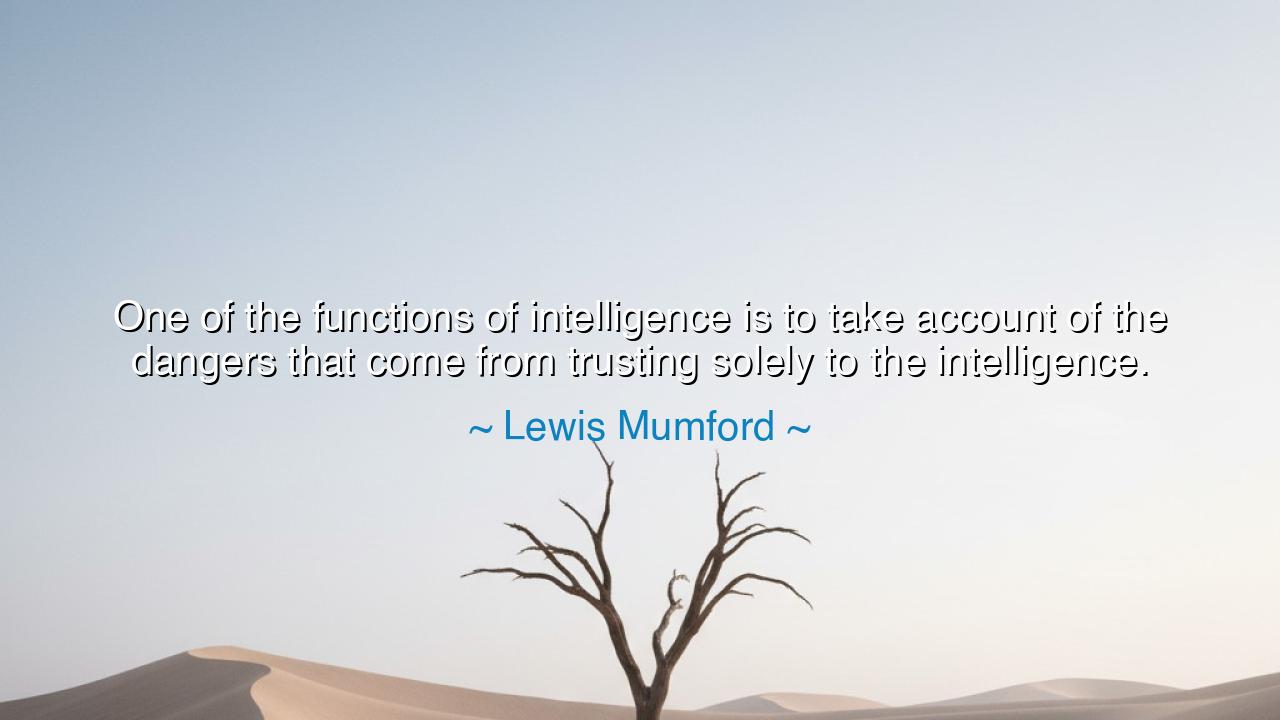
One of the functions of intelligence is to take account of the
One of the functions of intelligence is to take account of the dangers that come from trusting solely to the intelligence.






The words of Lewis Mumford, philosopher of civilization and prophet of balance, resound like an ancient warning whispered to a world intoxicated by its own cleverness: “One of the functions of intelligence is to take account of the dangers that come from trusting solely to the intelligence.” These are words born not of cynicism, but of deep understanding — a recognition that intelligence, though a gift divine, is a dangerous master when it forgets its own limits. Mumford, whose thought bridged the mechanical and the moral, reminds us that wisdom lies not in knowledge alone, but in knowing the boundaries of knowledge — that intellect without humility leads not to enlightenment, but to ruin.
To grasp the origin of this thought, we must look to the age in which Lewis Mumford lived — the twentieth century, when man’s intellect reached heights unimaginable to his ancestors. It was the age of machines, of atomic fire, of great technological triumphs and great moral catastrophes. Humanity, wielding its newfound intelligence, conquered disease, distance, and hunger — but also created weapons capable of extinguishing its own existence. Mumford, a historian of technology, watched as civilization began to worship its own inventions, as men trusted their intellect to solve every problem, forgetting the deeper realms of heart, conscience, and spirit. Thus, he warned: the highest form of intelligence must be self-reflective — aware of its power, but cautious of its pride.
The ancients knew this truth long before the rise of machines. In the myths of Greece, the tale of Icarus is told: how the clever son of Daedalus fashioned wings of wax and feather to escape imprisonment. Yet, intoxicated by the thrill of flight, Icarus soared too near the sun — and the very genius that lifted him became his downfall. His story is the eternal symbol of intellect untempered by wisdom. Mumford’s warning echoes that same ancient song: that intelligence, when it ceases to listen to humility, transforms from savior into destroyer. The mind that trusts only itself becomes blind to the higher truths that dwell beyond logic — truth born of empathy, intuition, and reverence for the mystery of life.
Consider also the story of the Manhattan Project, when the brightest minds of the modern world gathered to unlock the power of the atom. Their intelligence achieved what was once thought impossible — splitting the atom, releasing the energy of the stars. Yet in their triumph lay terror. From their laboratories came the bomb that leveled Hiroshima and Nagasaki, a weapon of such force that it forever altered the destiny of humankind. In the quiet after the blast, many of those same scientists felt the weight of what Mumford later described — that the intellect, without moral guidance, can become a sword in the hands of the blind. It was not knowledge that failed them, but wisdom. Intelligence, in isolation, cannot tell us what ought to be done — only what can be done.
Mumford’s wisdom, therefore, stands as a call to balance — to harmonize the powers of the mind with the virtues of the heart. He teaches that the truest intelligence is not arrogant but self-aware. The wise person does not despise knowledge but seeks to temper it with compassion. The ancients called this union phronesis — practical wisdom — the kind that knows when to act, when to question, and when to refrain. True intelligence, Mumford reminds us, is not a sword but a compass: it guides, but only when aligned with the deeper north of the human soul.
And in this age, when machines now think and data replaces discourse, Mumford’s warning grows ever more urgent. We live in a time when artificial intelligence advances with astonishing speed, and humanity stands at another threshold — like Icarus before the sun. We must not repeat the old folly of believing that intellect alone can save us. For technology without morality, progress without purpose, becomes the forge of our undoing. As Mumford foresaw, the highest function of intelligence is to guard us against our own inventions — to remind us that reason must serve life, not dominate it.
Thus, the lesson of Lewis Mumford’s words is clear and timeless: let your intelligence be guided by wisdom, and let wisdom be nourished by humility. Do not place faith in intellect alone, for the mind that worships itself becomes its own prison. Cultivate understanding, yes — but also conscience. Learn, create, discover — but remember to listen to the quiet voice of the soul that asks, Should we? as often as the mind asks, Can we?
So, dear listener, take this truth as your compass: intelligence is a mighty flame, but without the vessel of wisdom, it burns rather than illumines. Be both thinker and seeker, both innovator and guardian. Let your intellect serve love, and your knowledge serve life. For the truest mark of intelligence is not brilliance, but restraint — the power to know that even our greatest minds must kneel before the greater mystery of existence. In that humility lies not weakness, but the highest wisdom: the wisdom that keeps the light of intelligence from becoming the fire that consumes the world.






AAdministratorAdministrator
Welcome, honored guests. Please leave a comment, we will respond soon